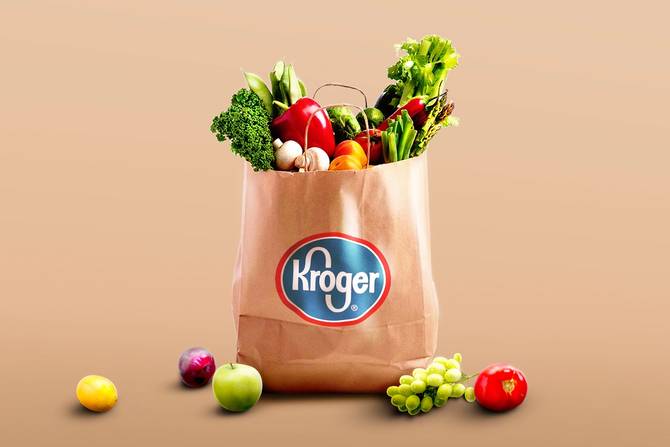Happy Friday. Sure, you can download that free report/guide/whatever. What’s the worst that could happen? Apparently, this. We’d like to see the full version of this marketing horror story.
In today’s edition:
- What being on a board really means
- Kroger’s first-party data tool
- What’s the Story, morning glory?
—Phoebe Bain, Zaid Shoorbajee
|
|
|
Francis Scialabba
Many aspects of this industry are a little too shrouded in mystery, from the ins and outs of third-party cookies to what exactly marketers do when they sit on the board of a company. So for corporate governance month, we decided to draw back the curtain on the latter and ask marketers what it’s really like being on the board of a company or organization—as well as who gets to be on these boards and who doesn’t.
So what does a marketer do once they’ve joined a board?
- Many things, but MakeLoveNotPorn founder and CEO Cindy Gallop, who sits on boards for We Are Rosie and liqueur brand Pomp and Whimsy, told Marketing Brew that, big picture, being on a board involves providing strategic direction, expertise, and support for the company’s benefit…all while holding it accountable to “objective standards of integrity and ethics” throughout.
- Armin Molavi, fractional marketing strategist at AMolavi Consulting, is an advisory board member for travel company Elude, said board members often serve as sounding boards for founders, providing an objective outside opinion that can be difficult to get from internal employees.
Big picture: “Some of the conversations I have with CEOs/founders I work with are about validating strategies/approaches, providing an impartial view on important decisions, and sometimes even suggesting to slow things down,” he told us, adding that other components of the role involve making relevant introductions, as well as helping find agency partners or new hires.
The why: Gallop, who founded the US branch of creative agency BBH earlier in her career, said she was asked to bring her marketing expertise to Pomp and Whimsy’s board after she met founder Dr. Nicola Nice at a college alumni event. According to Gallop, she thought she’d be a good fit since both women are “rampant feminists with a huge belief in the massive business and financial potential of innovation through the female lens.”
Read on for more pros, cons, and “did you knows?” about all things board membership from three marketers who also sit on boards.—PB
|
|
|
Francis Scialabba
Your purchase in the deli section could be fueling the ads you see on the web.
Kroger on Wednesday announced an advertising tool that lets marketers use its first-party shopper data in their programmatic ad buying.
-
The new offering was announced at an Advertising Week New York session on Wednesday, where Kroger’s SVP of precision marketing, Cara Pratt, touted the service’s flexibility and the sales insights it offers.
- The Kroger Private Marketplace gives access to shopper data from the grocery chain’s sales and loyalty programs. Marketers can apply that data to the demand-side platform of their choice, meaning they can use it to target people across the web, instead of on Kroger’s websites.
The tool also lets users track metrics like new buyers and sales lift. Onstage, Pratt made the case for retailers’ relevance in the ad business because of their ability to use shopper data to reflect a campaign’s success.
“It isn’t enough for a media publisher to sell impressions. It has to be driving results. Sales results matter,” she said. “Retailers have the ingredients to make brand advertising more effective."
Big retailers like Walmart and Lowe’s have been building out their digital advertising businesses. Kroger is one of the country’s largest supermarket retailers, also operating brands like Harris Teeter and QFC. The company’s data analytics arm, 84.51º, claims to have first-party retail data on nearly half of all US households.—ZS
|
|
|
|
You know that your digital commerce platform is key to your success. Investing in the wrong one kinda means giving your campaigns the campaign version of a torn hamstring ahead of a big race.
To sprint past the competition, try VTEX, the fastest-growing B2C platform in the world.
How’d they grow so quickly? Easy: Brands including Motorola, L’Oréal, Nissan, Coca-Cola, Levi’s, and Walmart run on its platform. As hitters go, those are some of the heavier ones.
Why do those marquee brands trust VTEX? Easy—it lets them build a site that meets their unique needs. Plus incredibly fast time to market, giving marketers the results they’re looking for right away.
Find out how VTEX can help you pull ahead of the pack here.
|
|
|
Mickey McDougall
Stories: Snapchat invented them, TikTok’s testing them, Pinterest’s trying to put its own twist on them, and LinkedIn’s already done away with them (RIP).
Yes, it’s a lot. If you’re stuck in a Stories stupor, Nicole Tabak, freelance content creator and copywriter, can relate. But she can also help.
In a piece for Marketing Brew, Tabak talks about why Stories are valuable + offers suggestions for how to incorporate them into your overall social media strategy. Read a snippet below, or click here for the full read.
As a frequent one-woman social team, I know how frustrating it can feel when social platforms add yet another way for you to create content. While all these features seem the same, platforms strongly discourage copying and reposting content from other networks (i.e., no, you can’t repost your TikToks as Instagram Reels). And your CMO is probably already asking you where your new TikTok Stories content plan is (hint: remind them the feature’s still in beta).
But here’s the hot take: Stories actually make sense as a platform feature. Sure, they may not have worked well on LinkedIn. But as marketers, we’ve created a high standard for the content that goes on our feeds. Society has long lusted over having the perfect grid aesthetic. Stories are a way to break that perfection down and explore a part of our brands that we may not otherwise get to.
Did you find this helpful? Yes, click here. No, click here.
|
|
-
Facebook is having a hard time dealing with duplicate accounts. As many as 11% of its monthly active users worldwide are duplicates, the WSJ reports.
-
Basis Technologies, a Chicago-based ad tech company, has filed to go public. It rebranded from the name Centro.
-
Donald Trump, famously banned from major social platforms, said he has the financial backing to launch a media venture that includes a social media platform and a streaming service.
-
HBO Max lost 1.8 million US subscribers in Q2, which owner AT&T attributed to the expiration of the streaming service’s integration with Amazon Prime Video.
-
Disney says it’s expecting more than $100 million in NHL–related ad sales and has nearly sold out its hockey ad inventory on ESPN this season.
|
|
|
|
Streams that make an impact. Audiences are streaming the biggest TV moments—from billionaires in space to gold-medal acrobatics. And if you’re looking for a partner to be part of these big experiences, there’s really only one choice: Roku. They can help you deliver better campaign outcomes at every stage of the funnel and reach the elusive linear audience that keeps disappearing. Put your brand at the center of TV’s biggest moments with Roku. TV starts here.
|
|
There are a lot of bad marketing tips out there. These aren’t those.
Influencing: Read about how a TikToker’s quirky videos about spreadsheet tips led to brand partnerships and allowed her to start her own business.
Social media: Reddit fancies itself as a “cultural radar,” according to its new report about social trends it’s seeing in its 100,000+ communities. Social Media Today breaks it down here.
SMS: Call me Beep me. Search Engine Journal has these 15 trends that can help local businesses with SMS marketing.
Slide into this DM diary: Get a sneak peek into the mind of ManyChat—the Instagram automation tool helping businesses and influencers up their Instagram game. Check out their diary entries here.*
*This is sponsored advertising content
|
|
Catch up on a few Marketing Brew stories you might have missed.
|
|
AD TECH COMPANY OR POKÉMON?
|
Giphy
There are a lot of questionably named companies in the murky marketing universe. Two of these are real ad tech companies. The rest are Pokémon. Can you tell them apart? Keep scrolling for the answers.
- Wooper
- Kwanzoo
- Amobee
- Lunatone
- Metagross
|
|
|
You're 2 referrals away from earning Morning Brew stickers.
Don't leave your laptop feeling naked. Cover it up with these Morning Brew stickers.

Hit the button below to learn more and access your rewards hub.
Click to Share
Or copy & paste your referral link to others:
morningbrew.com/marketing/r/?kid=303a04a9
|
|
AD TECH COMPANY OR POKÉMON ANSWERS
|
|
Kwanzoo and Amobee are the ad tech companies here. If you have one of them in your Poké Ball, it might not be very effective...
|
|
|
Written by
Phoebe Bain
Was this email forwarded to you? Sign up
here.
WANT MORE BREW?
Industry news, with a sense of humor →
-
HR Brew: analysis of the employee-employer relationship
Tips for smarter living →
 Podcasts →
Business Casual
and
Founder's Journal
Podcasts →
Business Casual
and
Founder's Journal
Accelerate Your Career →
-
MB/A: virtual 8-week program designed to broaden your skill set
|
ADVERTISE
//
CAREERS
//
SHOP
//
FAQ
Update your email preferences or unsubscribe
here.
View our privacy policy
here.
Copyright ©
2021
Morning Brew. All rights reserved.
22 W 19th St, 8th Floor, New York, NY 10011
|
|










